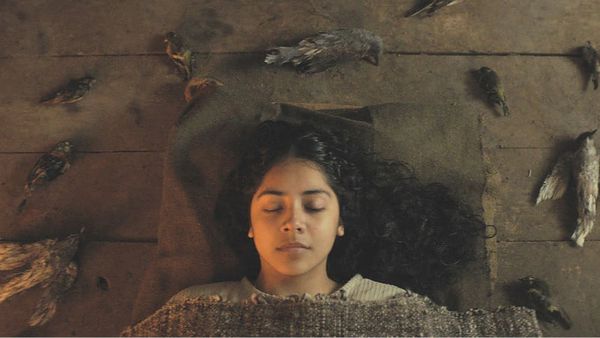Eye For Film >> Movies >> Sorcery (2023) Film Review
Sorcery
Reviewed by: Jennie Kermode

When the Spanish conquistadors moved into South America, they reached Chile last. Shielded by their mountains, the local people had time to develop new technologies, like the pike, which would give them a chance against armoured men on horseback. They were able to put up more of a fight. Of course, in the end they were conquered anyway, and still more brutally treated in response to their resistance. The people on the southern islands attracted all of this additional repression without the practical means of self-defence. As a consequence they are, to this day, some of the world’s poorest people – but one thing they did manage to hold onto was their culture. Christopher Murray’s powerful new film is set around a trial which, for a moment, held all that in balance.
It’s fictionalised, of course, in part because Murray is interested in different ways of perceiving and remembering history – at one point, one of his indigenous characters makes reference to a nebulous “time before anyone who is alive now had been born.” Myth blurs with fact but carries potent meaning, perhaps helping the important lessons to be remembered for longer. Although the German-speaking and Spanish-speaking white people who hold power on the island ostensibly believe that theirs is the superior culture, they fear the secret knowledge of those who were there before them, attributing supernatural powers to them even though this is at odds with their supposed Christianity and rationality. Somewhere buried within them is a recognition of their vulnerability, here at the edge of the world, and alongside it is an awareness of the injustices for which they are responsible, and all this leads to fear and discomfort which prompts them to carry out further injustices, clinging to control.
Rosa (Valentina Véliz Caileo) is just 13, her small frame straining under the burden of all this history. She’s a servant to a wealthy white family, but following a shocking incident in which all of the family’s livestock are slain, she finds herself alone, unable to get justice from state or church for her own devastating loss, and forced to reevaluate her previous assumption that following the dictates of white culture would make her a part of it. She is Huilliche, and the only way forward for her is to shed her Christianity and immerse herself in her ancestral beliefs. As she does so, she discovers a new confidence, strength and, perhaps, something else. With the suggestion of supernatural power comes an acknowledgement of what every coloniser fears the most: that the people they have cowed will become unstoppable if they are able to reconnect with their true identity.
It’s Caileo’s first time on screen, and her freshness is a lot of what makes it work. The emotion with which she invests Rosa is stark and unrefined, which gives the girl a kind of innocence in spite of everything that unfolds. In the Huilliche context, sorcery has no innate association with evil – it is simply about drawing on a different kind of power. The items used in the process, though deeply disturbing to the colonists, need not be explained in sinister terms – conflict again arises from misunderstanding. Even the vengeance that incites the colonists’ fury might be understood less as an act of violence than one of liberation for those most directly affected – if, indeed, it truly happens at all. In a context where belief becomes more consequential than reality, Murray maintains an element of uncertainty.
Part fantasy, part western, the film is exquisitely shot, the humid atmosphere of the island creating a degree of visual uncertainty to confound viewers further. The Huilliche are a sea people and it is among the swelling waves that Rosa begins to discover herself, close to the shore and yet easily engulfed in their vastness, swept away from the dry logic of her Christian learning and bluntly reminded of the power of the natural world.
Rosa’s purity of purpose contrasts with the more complex motives and tactics of adults on both sides of the divide, with even those she admires making moral compromises as they strive to resist. Murray doesn’t let anyone off the hook, and takes the time to expose the less direct but equally cruel ways in which white women uphold colonial power. Whilst the girl exercises forbearance, there is the potential for something much darker and more destructive within her. In this series of differently interpreted encounters, played out over just a few weeks, the future is taking shape.
Reviewed on: 13 Jun 2024
















